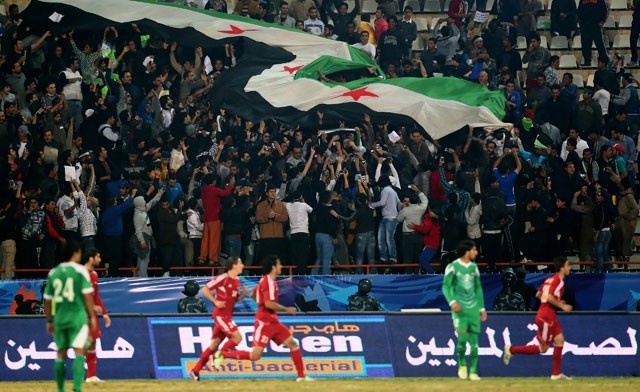The Syrian war that has been raging on mercilessly for the past four and a half years has left thousands dead and millions displaced.
The geographical boundaries of the modern nation state of Syria as we know it, have been blurred into obscurity by senseless acts of violence perpetrated by power hungry moguls.
The Syrian homeland has become a perplexing multi-faceted battleground — pitting the Iran-Russia backed pro Assad faction against the Western backed rebels of the Free Syrian Army (FSA). The introduction of the Islamic State or ISIS into the picture has further muddied the Syrian waters. The incessant fighting between these warring factions has turned Syria into a mass graveyard.
And yet, hope sometimes arises from the most unlikely places.
Syrian Football rises from the ashes
The spectacular performances of the Syrian football team or The Red Eagles in the Asian leg of the FIFA World Cup qualifiers have given renewed hope to a beleaguered nation. Against all odds, war-torn Syria currently sit at the summit of their FIFA World Cup qualification group having amassed 12 points from five matches played so far. Apart from Afghanistan, Cambodia and Singapore, Syriaa s group also features the Asian powerhouse Japan.
The timing of Syriaa s football renaissance is quite remarkable considering the current state of its national team. Over the past 5 years, several Syrian national team players have either died or fled the country or rebelled against the Assad regime. The iconic Abbasiyyin Stadium in Damascus, accustomed to the incessant roars of 50,000 passionate Syrian fans in the past, now thunders with the sound of T-62M battle tanks. Other football stadiums in the country, such as those in Banyas and Deraa, are now used as illegal detention centres by the government and the rebels alike.
(courtesy: livescore.com)
Former Syrian association football goalkeeper Abdul Baset Al-Sarout quit his team and openly took up arms against the Assad government. Al-Sarout is currently thought to be leading the rebel charge in the western province of Homs. His compatriot Musab Balhous was briefly imprisoned for giving shelter to rebel sympathisers and anti-Assad elements.
Firas Mohamad Al Khatib, who is one of the most prolific goal scorers in the history of Syrian football, quit the national team in 2012 due to a political reasonsa . He currently plies his trade with Al-Arai SC, a Kuwait-based club in the VIVA Premier League.
Prominent Syrian clubs such as Al-Karam and Al-Ittihad are a shadow of their former selves. Al Karam, a Homs based club that won the Syrian league 4 times in a row from 2006-10, is forced to play all its matches away from home. Al-Ittihad, on the other hand, is compelled to regularly field its third-string team on account of death and defections of its major players.
Syrian youth captain Mohammad Jaddoua refused to return to his homeland after appearing for the national team in Germany. His subsequent application for asylum in Germany prompted the Syrian Football Association (SFA) to “ban players from travelling abroad“.
a The regimea s persistence on resuming sporting activities is an irresponsible decision in light of the risks and dangers athletes could potentially face,a says Yasser al-Hallaq, the executive director of Athletes for Syria (as quoted by the Guardian). a This decision only validates the notion that the ruling regime wants to show the public that life is normal, which is absolutely not the case at all.a
(courtesy: AFP)
.
In fact, in order to underpin the notion of normalcy in the country, the Assad government offered cash rewards and government positions to Syrian players who won the West Asian football championship in 2012.
As documented by the award winning Middle East scholar James Dorsey, several players in the erstwhile Syrian national team defected to Lebanon to join a team fielded by the Free Syrian Army. As a way of protest, the FSA backed football team “sports green jerseys, the colour of the anti-Assad revolt as opposed to the national squada s red.” They view the national team currently operating on Syrian soil as the embodiment of the brutal atrocities committed by the government against its own people. For them, the Syrian national football team is an extension of the Assad regime.
Despite all the turmoil that presently engulfs the country, the Red Eagles are closer to qualifying for the FIFA World Cup than ever before. Forced to play all its home matches in Oman, the Syrian national team continues to defy all odds in its march towards securing an unlikely place in the greatest football extravaganza in the world.
Although Japan’s presence in the group makes qualification a strenuous task for the Syrians, one can be rest assured that they will not go down without a fight. Because fighting, is all that they’ve been doing lately.
a Hope rises like a phoenix from the ashes of shattered dreamsa a S. A. Sachs
